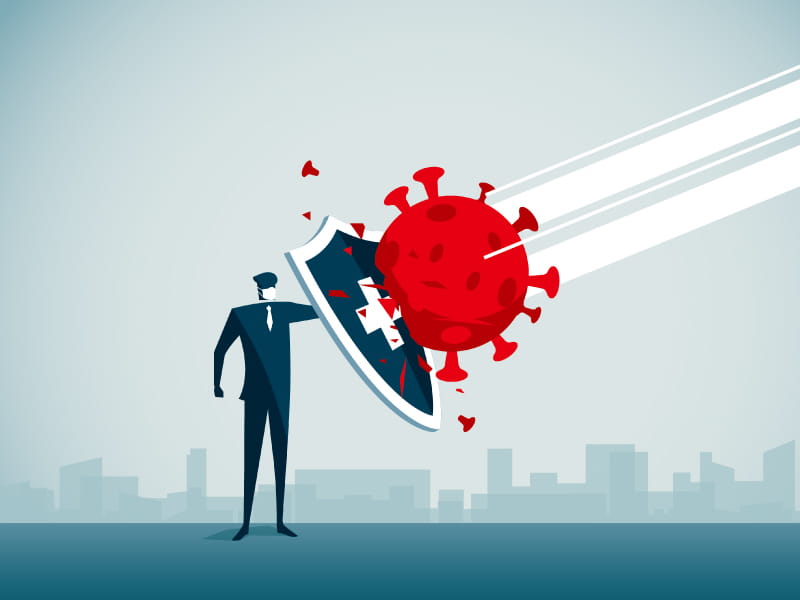Keep your immune system in top shape with these tips
By American Heart Association News

For years, Dr. Ahmad Garrett-Price has been counseling patients about the need to keep their immune systems strong, emphasizing exercise, nutrition and sleep.
As the COVID-19 pandemic toll continues to grow, the advice is even more relevant.
"We don't have a proven vaccine, and we don't have proven treatments," said Garrett-Price, a family practice physician with Baylor Scott & White Health System in Dallas. "So, our immune system is our first line of defense."
Although a strong immune system is helpful, he and other health experts stress the guidelines in place to battle the coronavirus's spread remain crucial: social distancing, frequent hand-washing, avoiding touching your face with unwashed hands, and staying at home as much as possible to avoid getting COVID-19 in the first place.
"But this is a viral infection, a much stronger viral infection than many other viruses," said Marie-Pierre St-Onge, associate professor of nutritional medicine and director of the Sleep Center of Excellence at Columbia University Irving Medical Center in New York City. "If your immune system is strong, you're better equipped to fight those infections, and the likelihood of having a milder case and recovering is better."
Garrett-Price calls his approach "lifestyle-centered medicine that really keeps you in the preventive mode." It starts with exercise, which in addition to cardiovascular benefits can contribute to good mental health and reduce stress – all important during this time of COVID-19.
"Exercise has anti-inflammatory benefits and promotes cellular repair, cell production and producing immune cells that help you fight off disease," he said.
In a study of 1,002 adults published in the British Journal of Sports Medicine in 2011, people who exercised at least five times a week cut their risk of colds by nearly half compared to people who were largely sedentary. Many of those who did get sick had less severe symptoms.
"You may need to exercise in a more socially responsible manner, in your home or garage or backyard," Garrett-Price said. "But it's great to get that heart rate up."
Eating right is no less important given that about 70% of the immune system is housed in the gut. "We want to drive home the concept of food as medicine," Garrett-Price said.
The healthy foods on his list may sound familiar but are worth repeating: green leafy vegetables, citrus fruits, nuts, berries, fish, whole grains, foods rich in vitamins A, C and E – and don't forget the garlic.
"Putting good food in your body benefits your overall immune system," he said.
So does giving your body enough rest.
St-Onge, who has conducted extensive research into the links between sleep and health, said studies show "people who have adequate sleep have a much stronger immune system than those who have poorer sleep."
She pointed to a 2015 study in the journal Sleep in which 164 healthy volunteers were given nasal drops containing rhinovirus, or the common cold, and sequestered in a hotel. Those who slept less than five hours per night had 4.5 times the odds of developing a cold than those who slept more than seven hours.
St-Onge said the current swirl of stressful news about the pandemic might make it harder to get a good night's sleep. She suggests relaxing activities before bed to ease the stress, with one particular recommendation.
"Shut the TV off a couple hours early and don't listen to the latest statistics," she said. "Enjoy your loved ones … and go to bed with a sound mind."
One silver lining in the current crisis might be that people staying at home don't have to commute to work. "So maybe take that time to wake up a little later," she said.
Garrett-Price sees another possible health benefit down the road.
"We've always known we were supposed to wash our hands to prevent the spread of germs," he said. "But now we really know it can prevent a potentially fatal disease. I think that whenever we get on the other side of this, we'll have a more health-conscious society."
Editor's note: Because of the rapidly evolving events surrounding the coronavirus, the facts and advice presented in this story may have changed since publication. Visit Heart.org for the latest coverage, and check with the Centers for Disease Control and Prevention and local health officials for the most recent guidance.
If you have questions or comments about this story, please email [email protected].





